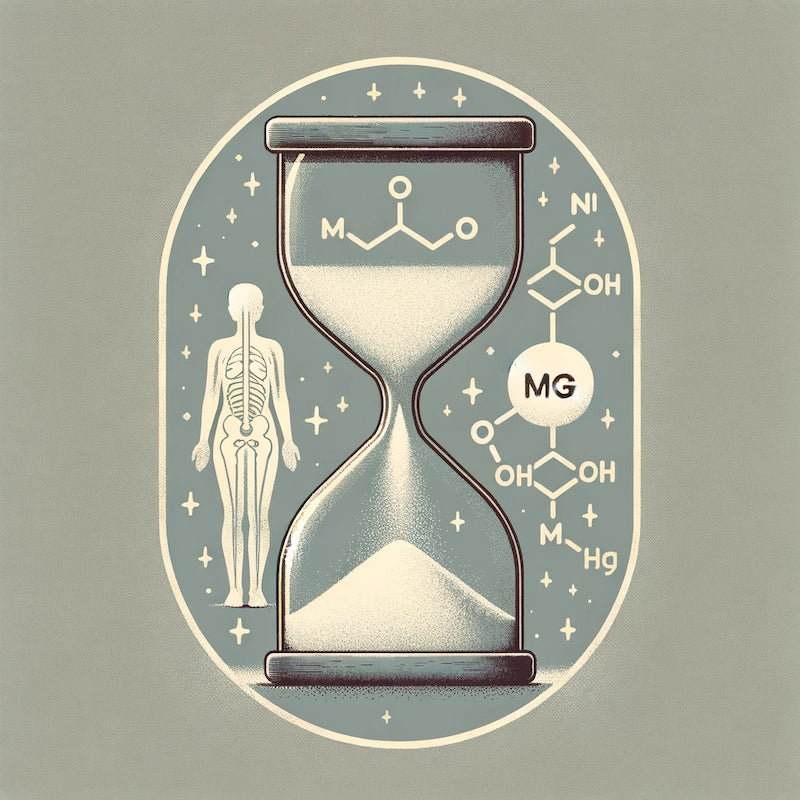MAGNESIUM: A POWER BOOSTER
According to the NIH, magnesium is an essential mineral vital to the health and well-being of the human body. It plays a central role in more than 300 biochemical processes, making it one of the most versatile and important elements of our diet. From supporting muscle and nerve function to promoting a healthy heart rhythm and strengthening the immune system.
However, in our modern diet, this important nutrient is often given insufficient attention, which can lead to a deficiency resulting in a variety of health problems. In this article we look at the multiple functions of magnesium, its sources, the effects of a deficiency and how to ensure an adequate supply to optimise and maintain health.

WHAT IS MAGNESIUM CITRATE?
Magnesium citrate is a form of magnesium supplement that combines the mineral magnesium with citric acid. Magnesium is an essential mineral that supports various vital functions in the body and is known for its beneficial effects, such as: maintaining bone health, proper muscle and nerve function, and blood sugar regulation.
The citric acid in magnesium citrate enhances magnesium absorption in the gut and may also exhibit both acidifying and alkalising effects in the body, depending on the physiological context.
Magnesium citrate is commonly used as a dietary supplement to address magnesium deficiencies or to help with medical conditions that may benefit from increased magnesium intake.
Magnesium citrate is sometimes used as a mild laxative to help relieve constipation. As with any supplement, it's important to consult a healthcare professional before use—particularly if you have existing medical conditions or are taking other medications.

The Role of Magnesium and Its Health Benefits
1. Maintaining Bone Health: Magnesium is essential for the formation and maintenance of healthy bones. It aids in the absorption of calcium and plays a crucial role in bone mineralisation, which may contribute to the prevention of diseases such as osteoporosis.
2. Muscle and Nerve Function: Magnesium is necessary for proper muscle contraction and relaxation. It also plays a role in the transmission of nerve impulses, thus contributing to the optimal functioning of the nervous system.
3. Blood Sugar Regulation: Magnesium is involved in the activity of insulin, the hormone responsible for regulating blood sugar levels. It has been suggested that adequate levels of magnesium may help reduce the risk of type 2 diabetes.
4. Constipation Relief: Magnesium citrate, in particular, is sometimes used as a mild laxative. It helps soften the stool and facilitates its passage through the intestine, thus relieving occasional constipation.
5. Cardiovascular Support: Magnesium plays a role in regulating heart rate and blood pressure. It has been associated with a lower risk of cardiovascular disease, although the exact relationship is still under investigation.
6. Stress and Anxiety Reduction: Some research suggests that magnesium may have beneficial effects in reducing stress and anxiety. It is involved in the production of neurotransmitters that affect mood.

Magnesium and the liver
Magnesium for Liver Health: Benefits and Effects
Magnesium plays an essential role in several physiological processes that can positively influence liver health. Some of the benefits of magnesium for the liver include:
1. Detoxification Support: The liver is the body’s primary detox organ. Magnesium may aid this process by participating in the conjugation and neutralisation of toxins and chemicals, enhancing the liver’s natural detoxification capacity.
2. Enzyme Regulation: Magnesium is vital for the proper function of many enzymes, including those involved in the metabolism of proteins and carbohydrates. By supporting enzymatic activity, magnesium may contribute to the overall regulation of liver function.
3. Reduction of Inflammation: Magnesium possesses anti-inflammatory properties. Since chronic inflammation is a key factor in many liver diseases, magnesium may help reduce liver inflammation and support tissue health.
4. Prevention of Hepatic Steatosis: Non-alcoholic fatty liver disease (NAFLD) and its more severe form, non-alcoholic steatohepatitis (NASH), are conditions marked by fat accumulation in the liver. Some studies indicate that magnesium may help prevent or improve these conditions by supporting metabolic and cellular balance.
5. Blood Sugar Regulation: Magnesium plays a role in maintaining stable blood glucose levels, which is crucial for preventing liver complications associated with insulin resistance and diabetes.
6. Protection Against Oxidative Stress: With its antioxidant properties, magnesium can help protect liver cells from oxidative damage, reducing the risk of long-term liver cell injury.
Important Note: While magnesium can support liver health, its effectiveness may vary based on individual health conditions and medical history. Always consult a healthcare provider before beginning any supplementation, especially if you have liver disease or are on medication.

NASSIM JAMALZADEH:
"Magnesium makes a decisive contribution to the regulation of muscle function. Especially during intense physical activity, it is advisable to take magnesium supplements to maintain muscle function and support regeneration processes. Magnesium is also very important for maintaining bone health and dental care. Therefore, I strongly recommend paying attention to a magnesium balance and taking magnesium supplements."
FAQs about magnesium
FAQs about magnesium
Yes, you can take magnesium during pregnancy. However, you should consult your doctor before taking it. The German Nutrition Society, for example, recommends a daily magnesium intake of 310 mg for pregnant women. However, you should always pay attention to the dosage during pregnancy, as a large amount of magnesium can cause diarrhoea or at least loose stools. This is mainly because magnesium relaxes the muscles and thus softens the intestinal musculature, for example.
Our bears have been developed for the adult body, so we can only make a recommendation for adults. It is noted that children aged 4 to 13 years (depending on age and gender) should take 120 to 250 milligrams of magnesium per day. Adolescents from the age of 13 (depending on age and sex) have a daily requirement of 310 to 400 milligrams of magnesium. We recommend consulting your doctor before taking our bears and reducing the dose to 2 bears a day.
We recommend that you stick to the recommended intake. An overdose can have very unpleasant consequences. Additional magnesium intake of 300 mg per day or more can lead to diarrhoea and gastrointestinal discomfort. A dose of more than 2,500 mg per day can even have very dangerous side effects, such as a drop in blood pressure or muscle weakness.


















